Charles E W Bean, Diaries, AWM38 3DRL 606/245/1 - 1915 - 1925 - Part 13
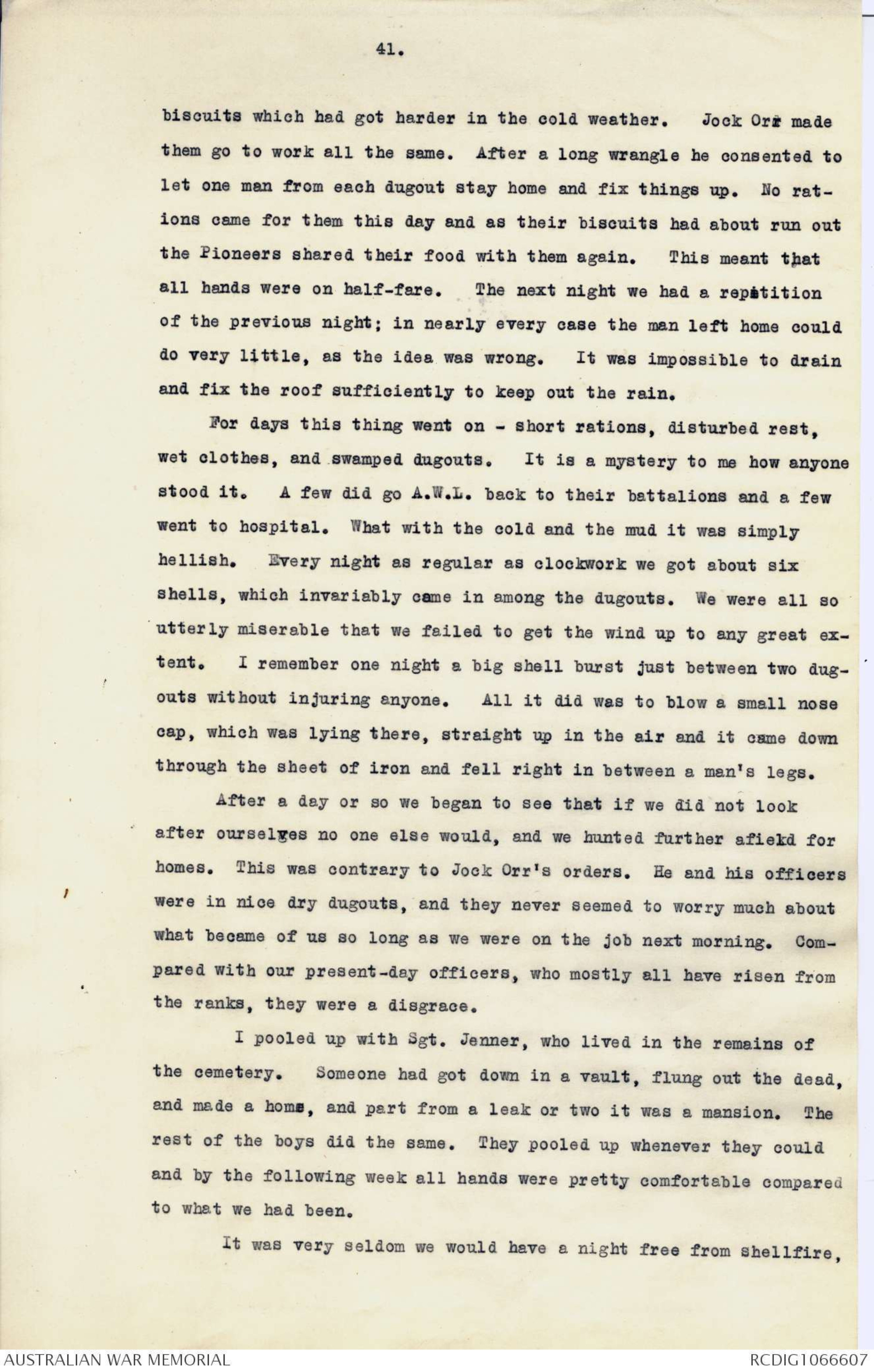
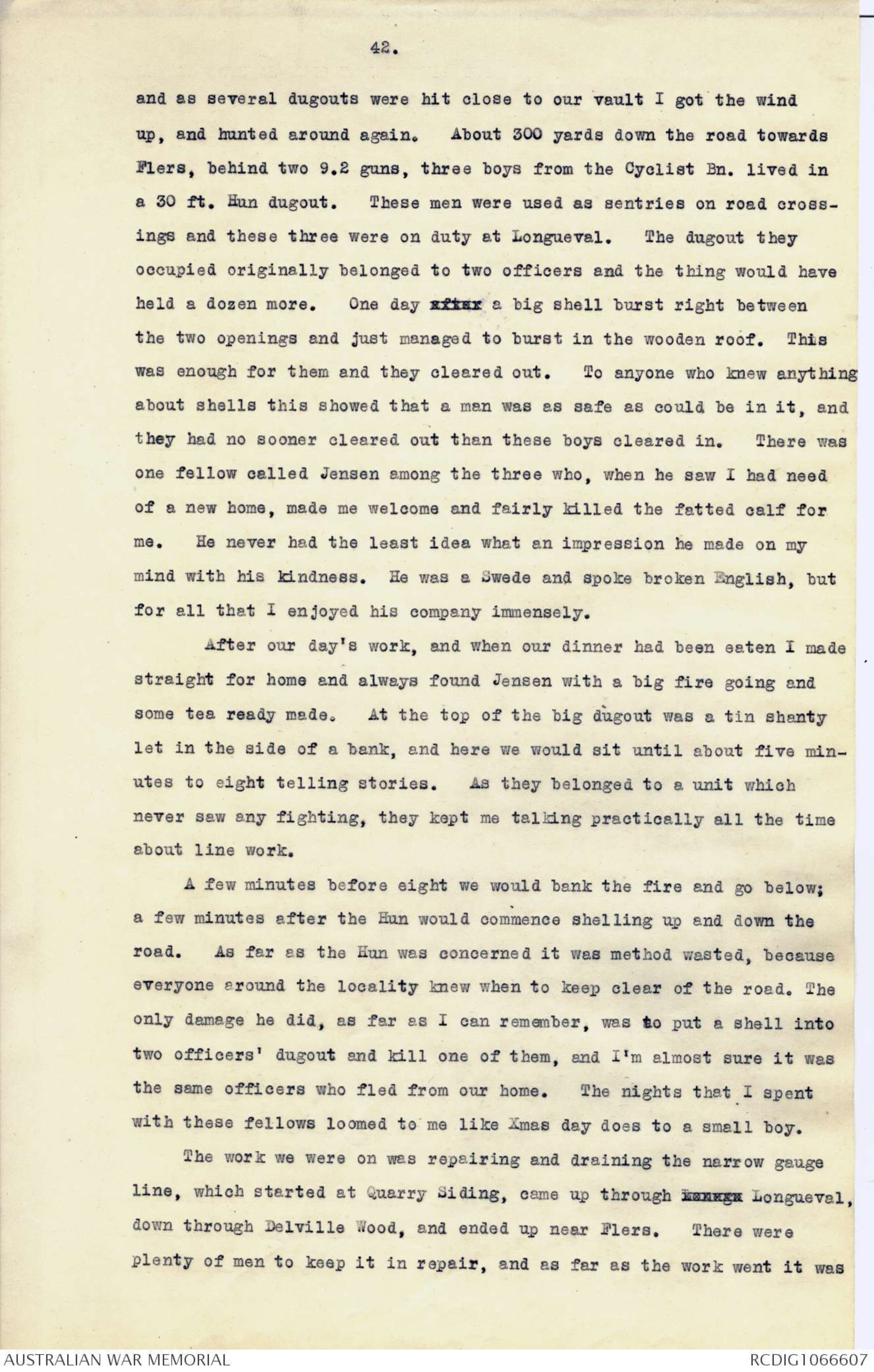
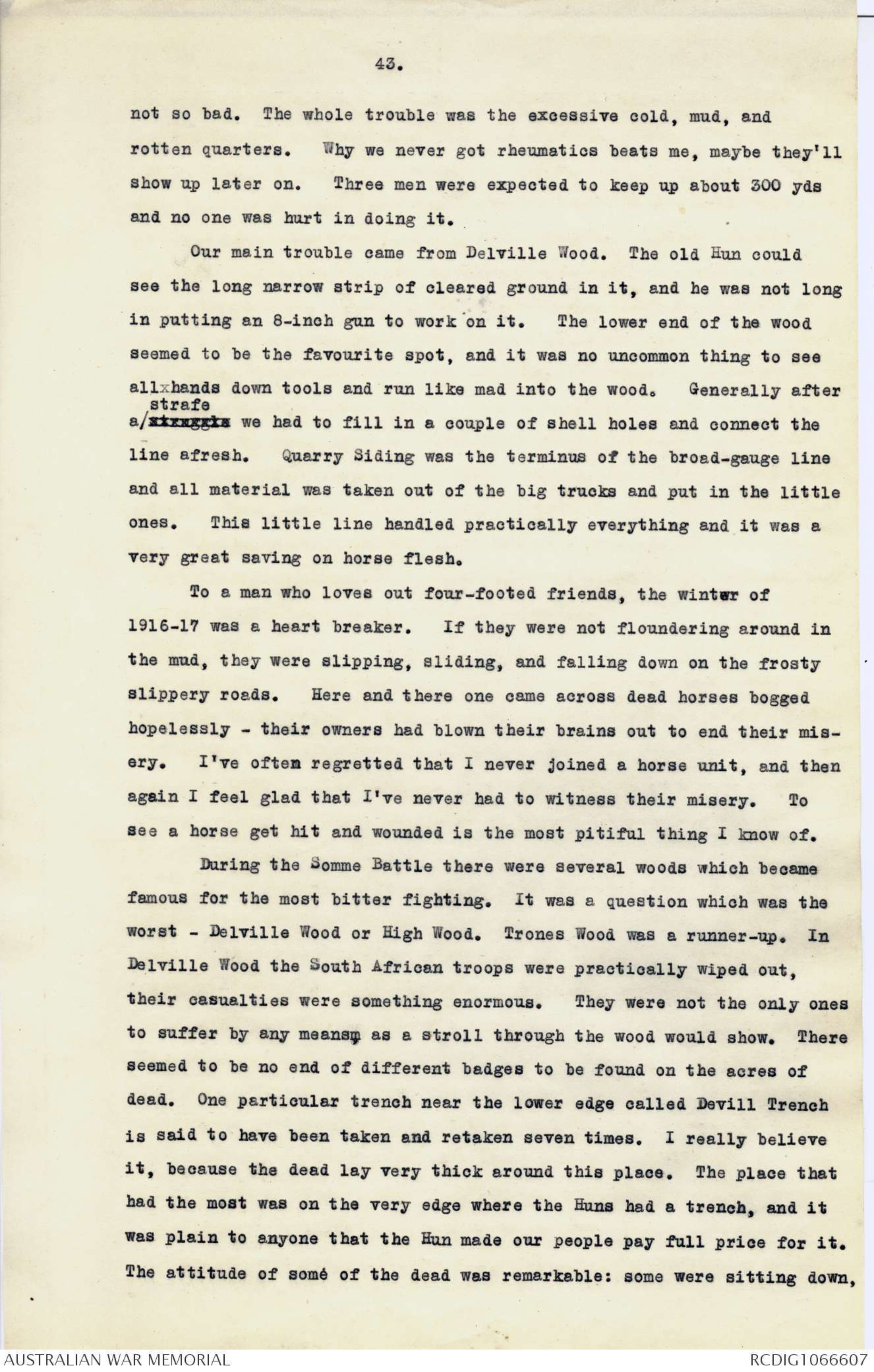
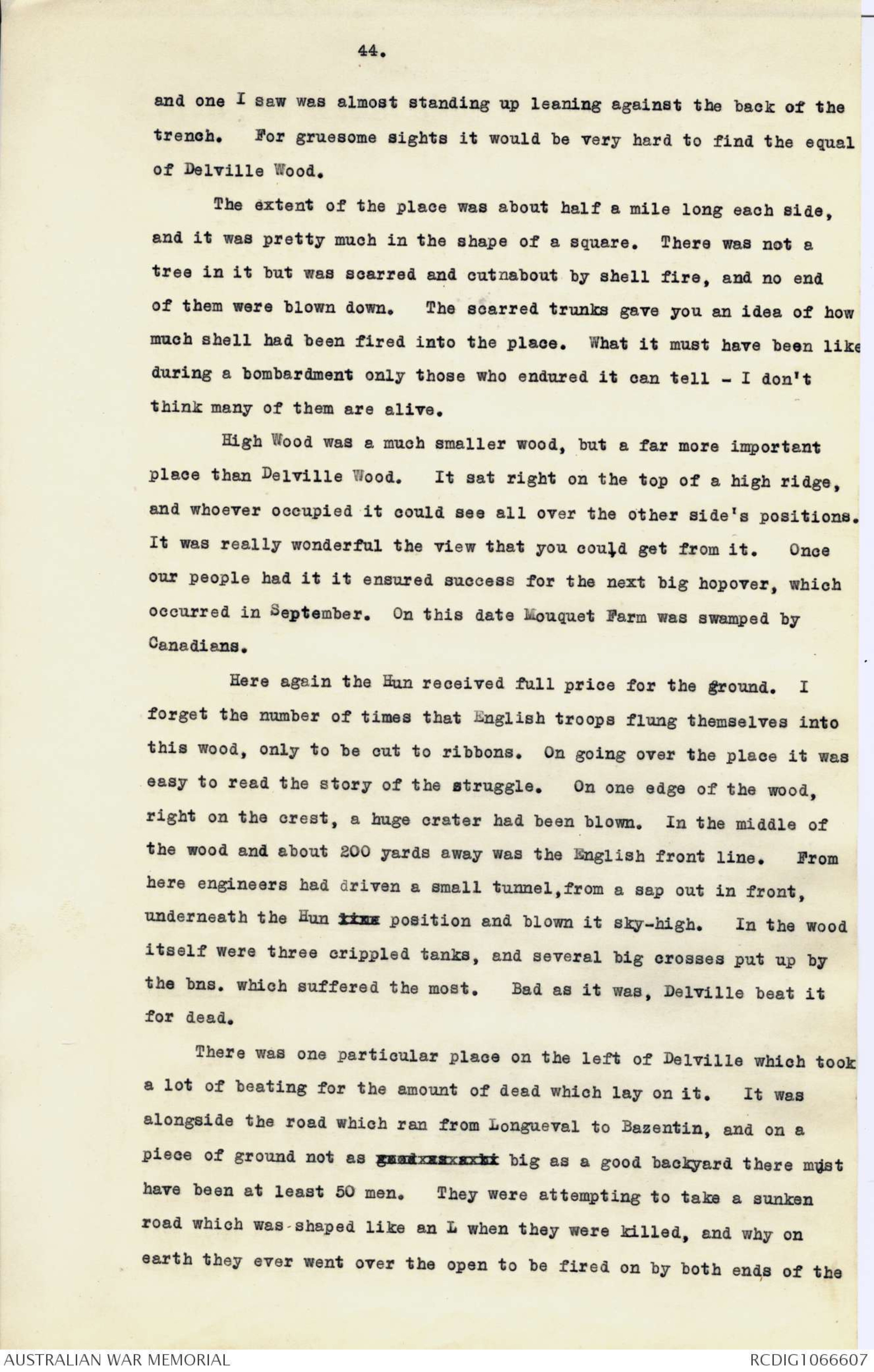
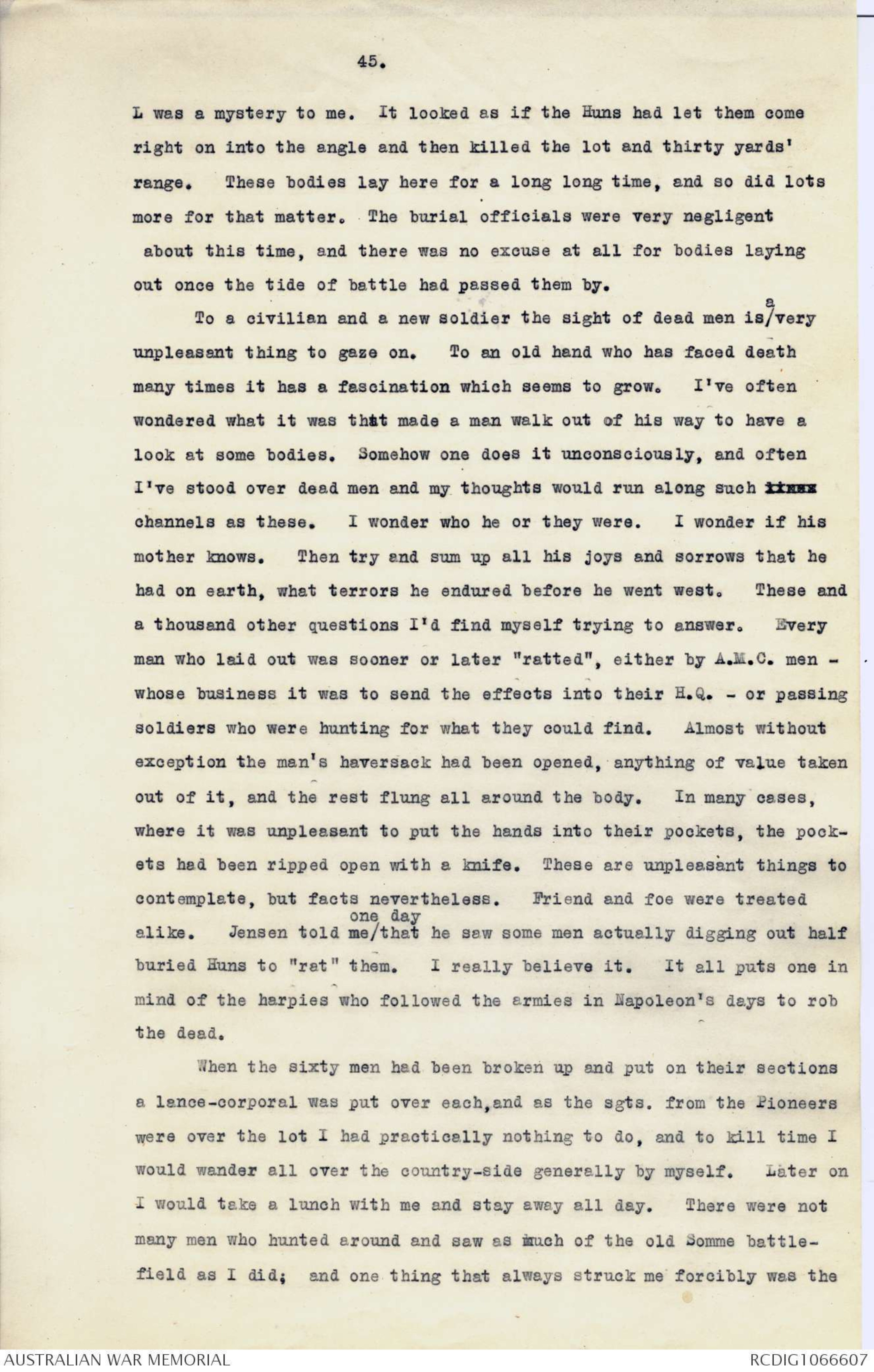
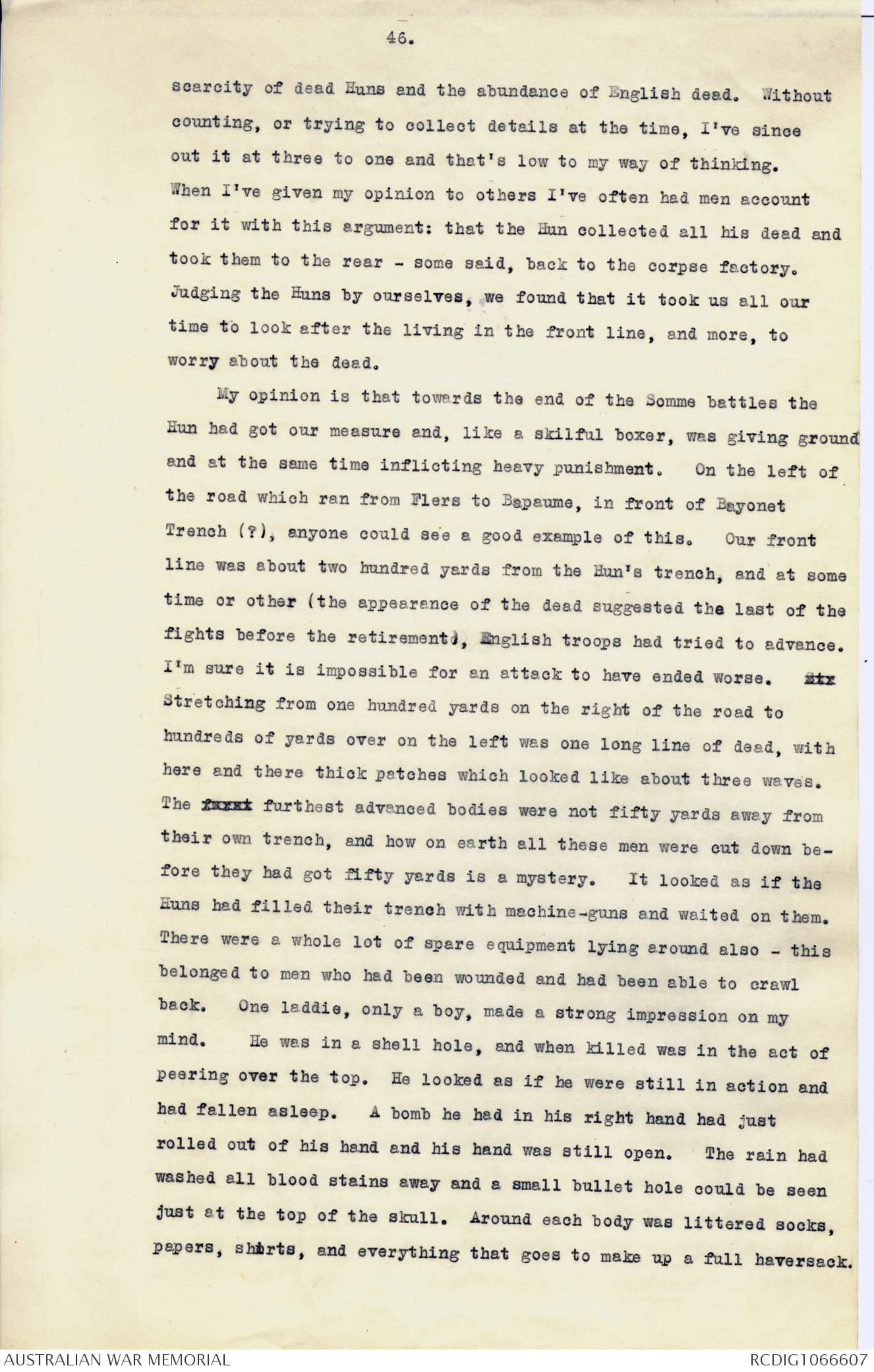
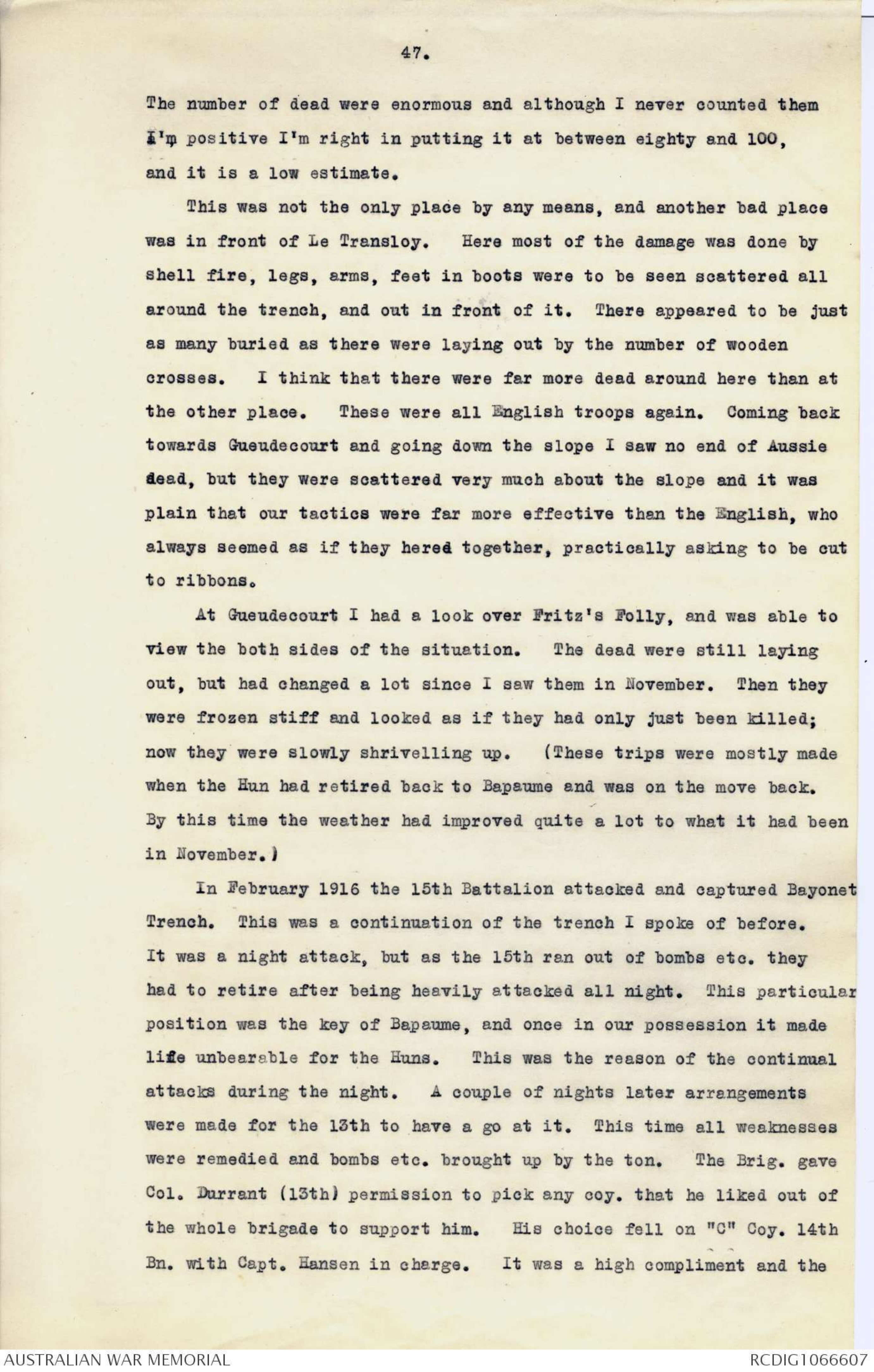
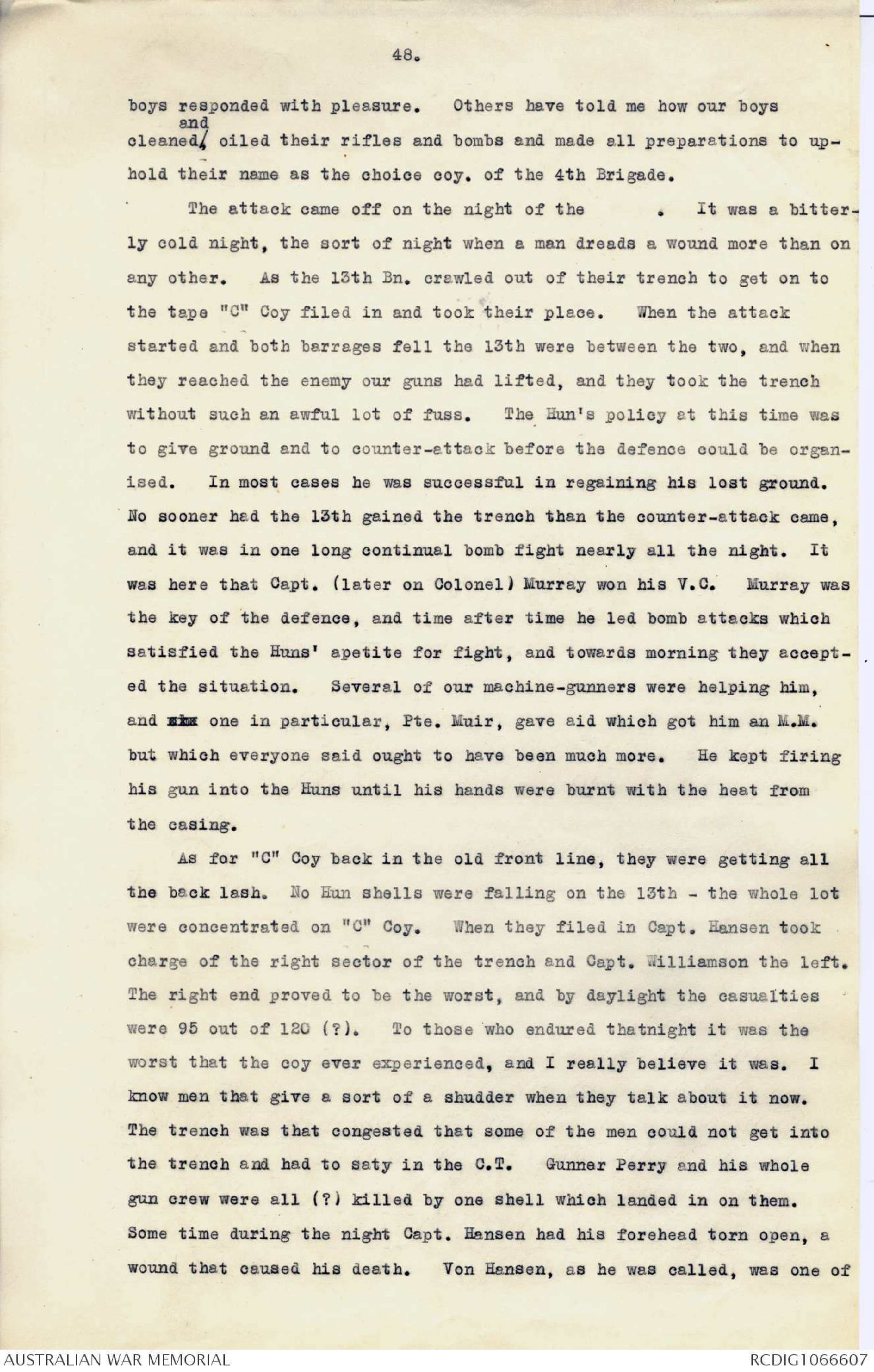
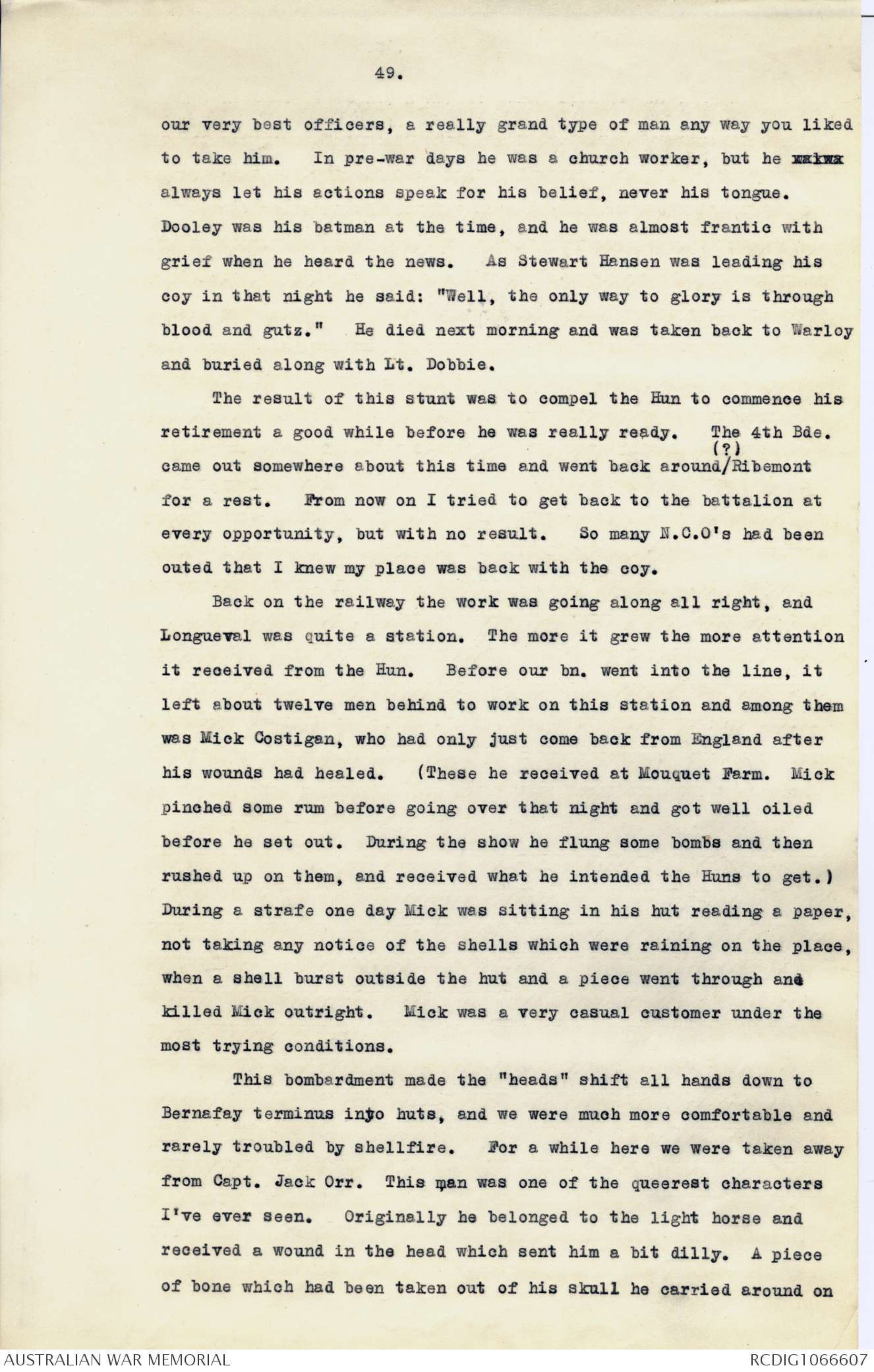
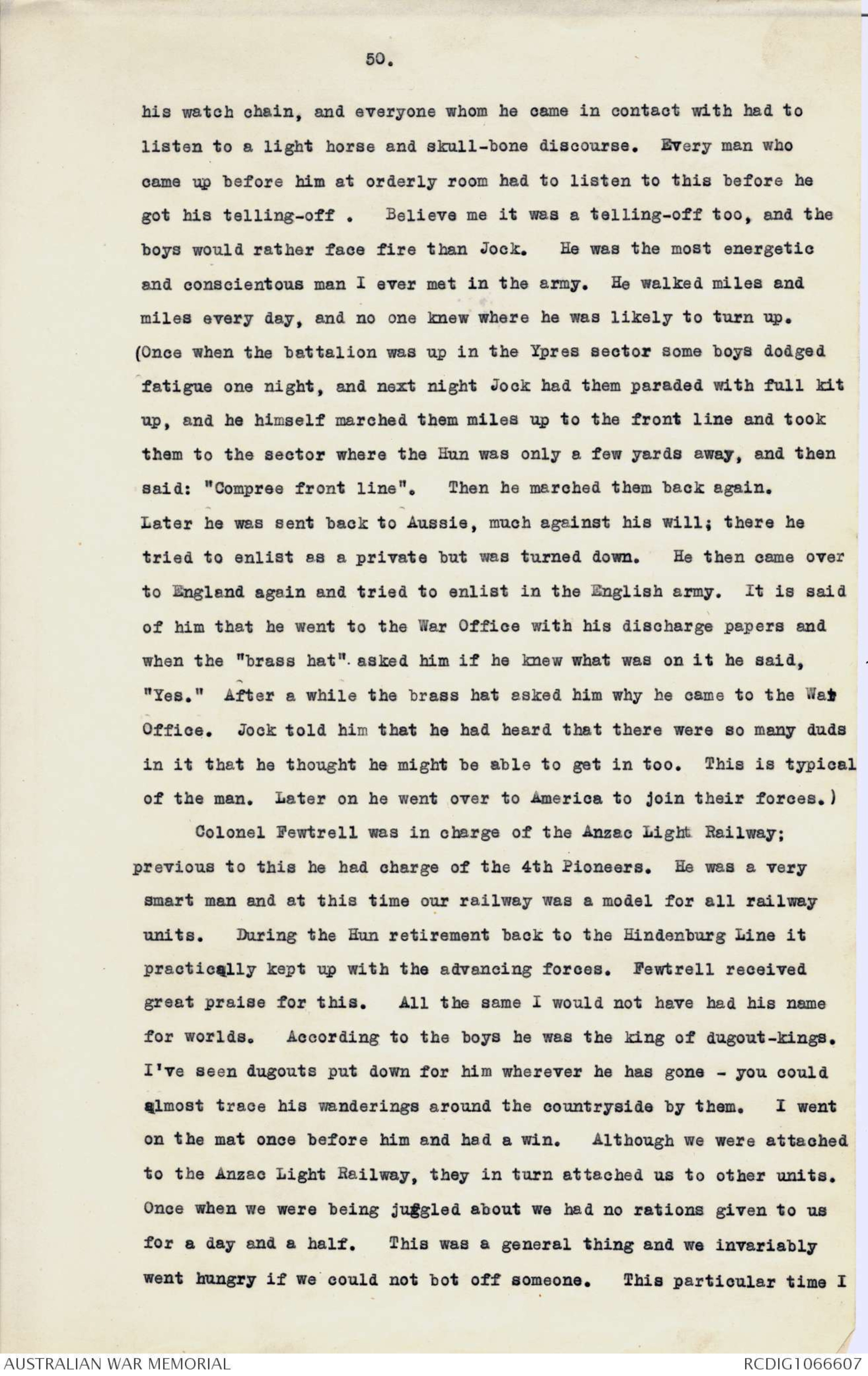
41.
biscuits which had got harder in the cold weather. Jock Orr made
them go to work all the same. After a long wrangle he consented to
let one man from each dugout stay home and fix things up. No rations
came for them this day and as their biscuits had about run out
the Pioneers shared their food with them again. This meant that
all hands were on half-fare. The next night we had a repetition
of the previous night; in nearly every case the man left home could
do very little, as the idea was wrong. It was impossible to drain
and fix the roof sufficiently to keep out the rain.
For days this thing went on - short rations, disturbed rest,
wet clothes, and swamped dugouts. It is a mystery to me how anyone
stood it. A few did go A.W.L. back to their battalions and a few
went to hospital. What with the cold and the mud it was simply
hellish. Every night as regular as clockwork we got about six
shells, which invariably came in among the dugouts. We were all so
utterly miserable that we failed to get the wind up to any great extent.
I remember one night a big shell burst just between two dugouts
without injuring anyone. All it did was to blow a small nose
cap, which was lying there, straight up in the air and it came down
through the sheet of iron and fell right in between a man's legs.
After a day or so we began to see that if we did not look
after ourselves no one else would, and we hunted further afield for
homes. This was contrary to Jock Orr's orders. He and his officers
were in nice dry dugouts, and they never seemed to worry much about
what became of us so long as we were on the job next morning. Compared
with our present-day officers, who mostly all have risen from
the ranks, they were a disgrace.
I pooled up with Sgt. Jenner, who lived in the remains of
the cemetery. Someone had got down in a vault, flung out the dead,
and made a home, and part from a leak or two it was a mansion. The
rest of the boys did the same. They pooled up whenever they could
and by the following week all hands were pretty comfortable compared
to what we had been.
It was very seldom we would have a night free from shellfire,
42.
and as several dugouts were hit close to our vault I got the wind
up, and hunted around again. About 300 yards down the road towards
Flers, behind two 9.2 guns, three boys from the Cyclist Bn. lived in
a 30 ft. Hun dugout. These men were used as sentries on road crossings
and these three were on duty at Longueval. The dugout they
occupied originally belonged to two officers and the thing would have
held a dozen more. One day after big shell burst right between
the two openings and just managed to burst in the wooden roof. This
was enough for them and they cleared out. To anyone who knew anything
about shells this showed that a man was as safe as could be in it, and
they had no sooner cleared out than these boys cleared in. There was
one fellow called Jensen among the three who, when he saw I had need
of a new home, made me welcome and fairly killed the fatted calf for
me. He never had the least idea what an impression he made on my
mind with his kindness. He was a Swede and spoke broken English, but
for all that I enjoyed his company immensely.
After our day's work, and when our dinner had been eaten I made
straight for home and always found Jensen with a big fire going and
some tea ready made. At the top of the big dugout was a tin shanty
let in the side of a bank, and here we would sit until about five minutes
to eight telling stories. As they belonged to a unit which
never saw any fighting, they kept me talking practically all the time
about line work.
A few minutes before eight we would bank the fire and go below;
a few minutes after the Hun would commence shelling up and down the
road. As far as the Hun was concerned it was method wasted, because
everyone around the locality knew when to keep clear of the road. The
only damage he did, as far as I can remember, was to put a shell into
two officers' dugout and kill one of them, and I'm almost sure it was
the same officers who fled from our home. The nights that I spent
with these fellows loomed to me like Xmas day does to a small boy.
The work we were on was repairing and draining the narrow gauge
line, which started at Quarry Siding, came up through xxxxxx Longueval,
down through Delville Wood, and ended up near Flers. There were
plenty of men to keep it in repair, and as far as the work went it was
43.
not so bad. The whole trouble was the excessive cold, mud, and
rotten quarters. Why we never got rheumatics beats me, maybe they'll
show up later on. Three men were expected to keep up about 300 yds
and no one was hurt in doing it.
Our main trouble came from Delville Wood. The old Hun could
see the long narrow strip of cleared ground in it, and he was not long
in putting an 8-inch gun to work on it. The lower end of the wood
seemed to be the favourite spot, and it was no uncommon thing to see
allxhands down tools and run like mad into the wood. Generally after
a ^strafe struggle we had to fill in a couple of shell holes and connect the
line afresh. Quarry Siding was the terminus of the broad-gauge line
and all material was taken out of the big trucks and put in the little
ones. This little line handled practically everything and it was a
very great saving on horse flesh.
To a man who loves out four-footed friends, the winter of
1916-17 was a heart breaker. If they were not floundering around in
the mud, they were slipping, sliding, and falling down on the frosty
slippery roads. Here and there one came across dead horses bogged
hopelessly - their owners had blown their brains out to end their misery.
I've often regretted that I never joined a horse unit, and then
again I feel glad that I've never had to witness their misery. To
see a horse get hit and wounded is the most pitiful thing I know of.
During the Somme Battle there were several woods which became
famous for the most bitter fighting. It was a question which was the
worst - Delville Wood or High Wood. Trones Wood was a runner-up. In
Delville Wood the South African troops were practically wiped out
their casualties were something enormous. They were not the only ones
to suffer by any means as a stroll through the wood would show. There
seemed to be no end of different badges to be found on the acres of
dead. One particular trench near the lower edge called Devill Trench
is said to have been taken and retaken seven times. I really believe
it, because the dead lay very thick around this place. The place that
had the most was on the very edge where the Huns had a trench, and it
was plain to anyone that the Hun made our people pay full price for it.
The attitude of some of the dead was remarkable: some were sitting down,
44.
and one I saw was almost standing up leaning against the back of the
trench. For gruesome sights it would be very hard to find the equal
of Delville Wood.
The extent of the place was about half a mile long each side,
and it was pretty much in the shape of a square. There was not a
tree in it but was scarred and cutnabout by shell fire, and no end
of them were blown down. The scarred trunks gave you an idea of how
much shell had been fired into the place. What it must have been like
during a bombardment only those who endured it can tell - I don't
think many of them are alive.
High Wood was a much smaller wood, but a far more important
place than Delville Wood. It sat right on the top of a high ridge,
and whoever occupied it could see all over the other side's positions.
It was really wonderful the view that you could get from it. Once
our people had it it ensured success for the next big hopover, which
occurred in September. On this date Mouquet Farm was swamped by
Canadians
Here again the Hun received full price for the ground. I
forget the number of times that English troops flung themselves into
this wood, only to be cut to ribbons. On going over the place it was
easy to read the story of the struggle. On one edge of the wood,
right on the crest, a huge crater had been blown. In the middle of
the wood and about 200 yards away was the English front line. From
here engineers had driven a small tunnel, from a sap out in front,
underneath the Hun lixe position and blown it sky-high. In the wood
itself were three crippled tanks, and several big crosses put up by
the bns. which suffered the most. Bad as it was, Delville beat it
for dead.
There was one particular place on the left of Delville which took
a lot of beating for the amount of dead which lay on it. It was
alongside the road which ran from Longueval to Bazentin, and on a
piece of ground not as good as a xi big as a good backyard there must
have been at least 50 men. They were attempting to take a sunken
road which was shaped like an L when they were killed, and why on
earth they ever went over the open to be fired on by both ends of the
45.
L was a mystery to me. It looked as if the Huns had let them come
right on into the angle and then killed the lot and thirty yards'
range. These bodies lay here for a long long time, and so did lots
more for that matter. The burial officials were very negligent
about this time, and there was no excuse at all for bodies laying
out once the tide of battle had passed them by.
To a civilian and a new soldier the sight of dead men is ^a very
unpleasant thing to gaze on. To an old hand who has faced death
many times it has a fascination which seems to grow. I've often
wondered what it was that made a man walk out of his way to have a
look at some bodies. Somehow one does it unconsciously, and often
I've stood over dead men and my thoughts would run along such xxxxx
channels as these. I wonder who he or they were. I wonder if his
mother knows. Then try and sum up all his joys and sorrows that he
had on earth, what terrors he endured before he went west. These and
a thousand other questions I'd find myself trying to answer. Every
man who laid out was sooner or later "ratted", either by A.M.C. men -
whose business it was to send the effects into their H.Q. - or passing
soldiers who were hunting for what they could find. Almost without
exception the man's haversack had been opened, anything of value taken
out of it, and the rest flung all around the body. In many cases,
where it was unpleasant to put the hands into their pockets, the pockets
had been ripped open with a knife. These are unpleasant things to
contemplate, but facts nevertheless. Friend and foe were treated
alike. Jensen told me ^one day that he saw some men actually digging out half
buried Huns to "rat” them. I really believe it. It all puts one in
mind of the harpies who followed the armies in Napoleon's days to rob
the dead.
When the sixty men had been broken up and put on their sections
a lance-corporal was put over each, and as the sgts. from the Pioneers
were over the lot I had practically nothing to do, and to kill time I
would wander all over the country-side generally by myself. Later on
I would take a lunch with me and stay away all day. There were not
many men who hunted around and saw as much of the old Somme battlefield
as I did; and one thing that always struck me forcibly was the
46.
scarcity of dead Huns and the abundance of English dead. Without
counting, or trying to collect details at the time, I've since
out it at three to one and that's low to my way of thinking.
When I've given my opinion to others I've often had men account
for it with this argument: that the Hun collected all his dead and
took them to the rear - some said, back to the corpse factory.
Judging the Huns by ourselves, we found that it took us all our
time to look after the living in the front line, and more, to
worry about the dead.
My opinion is that towards the end of the Somme battles the
Hun had got our measure and, like a skilful boxer, was giving ground
and at the same time inflicting heavy punishment. On the left of
the road which ran from Flers to Bapaume, in front of Bayonet
Trench (?), anyone could see a good example of this. Our front
line was about two hundred yards from the Hun's trench, and at some
time or other (the appearance of the dead suggested the last of the
fights before the retirement), English troops had tried to advance.
I'm sure it is impossible for an attack to have ended worse. Str
Stretching from one hundred yards on the right of the road to
hundreds of yards over on the left was one long line of dead, with
here and there thick patches which looked like about three waves.
The furst furthest advanced bodies were not fifty yards away from
their own trench, and how on earth all these men were cut down before
they had got fifty yards is a mystery. It looked as if the
Huns had filled their trench with machine-guns and waited on them.
There were a whole lot of spare equipment lying around also - this
belonged to men who had been wounded and had been able to crawl
back. One laddie, only a boy, made a strong impression on my
mind. He was in a shell hole, and when killed was in the act of
peering over the top. He looked as if he were still in action and
had fallen asleep. A bomb he had in his right hand had just
rolled out of his hand and his hand was still open. The rain had
washed all blood stains away and a small bullet hole could be seen
just at the top of the skull. Around each body was littered socks,
papers, shirts, and everything that goes to make up a full haversack.
47.
The number of dead were enormous and although I never counted them
I'm positive I'm right in putting it at between eighty and 100,
and it is a low estimate.
This was not the only place by any means, and another bad place
was in front of Le Transloy. Here most of the damage was done by
shell fire, legs, arms, feet in boots were to be seen scattered all
around the trench, and out in front of it. There appeared to be just
as many buried as there were laying out by the number of wooden
crosses. I think that there were far more dead around here than at
the other place. These were all English troops again. Coming back
towards Gueudecourt and going down the slope I saw no end of Aussie
dead, but they were scattered very much about the slope and it was
plain that our tactics were far more effective than the English, who
always seemed as if they hered together, practically asking to be cut
to ribbons.
At Gueudecourt I had a look over Fritz's Folly, and was able to
view the both sides of the situation. The dead were still laying
out, but had changed a lot since I saw them in November. Then they
were frozen stiff and looked as if they had only just been killed;
now they were slowly shrivelling up. (These trips were mostly made
when the Hun had retired back to Bapaume and was on the move back.
By this time the weather had improved quite a lot to what it had been
in November.)
In February 1916 the 15th Battalion attacked and captured Bayonet
Trench. This was a continuation of the trench I spoke of before.
It was a night attack, but as the 15th ran out of bombs etc. they
had to retire after being heavily attacked all night. This particular
position was the key of Bapaume, and once in our possession it made
life unbearable for the Huns. This was the reason of the continual
attacks during the night. A couple of nights later arrangements
were made for the 13th to have a go at it. This time all weaknesses
were remedied and bombs etc. brought up by the ton. The Brig. gave
Col. Durrant (13th) permission to pick any coy. that he liked out of
the whole brigade to support him. His choice fell on "C" Coy. 14th
Bn. with Capt. Hansen in charge. It was a high compliment and the
48.
boys responded with pleasure. Others have told me how our boys
cleaned ^and oiled their rifles and bombs and made all preparations to uphold
their name as the choice coy, of the 4th Brigade.
The attack came off on the night of the . It was a bitterly
cold night, the sort of night when a man dreads a wound more than on
any other. As the 13th Bn. crawled out of their trench to get on to
the tape "C" Coy filed in and took their place. When the attack
started and both barrages fell the 13th were between the two, and when
they reached the enemy our guns had lifted, and they took the trench
without such an awful lot of fuss. The Hun's policy at this time was
to give ground and to counter-attack before the defence could be organised.
In most cases he was successful in regaining his lost ground.
No sooner had the 13th gained the trench than the counter-attack came,
and it was in one long continual bomb fight nearly all the night. It
was here that Capt. (later on Colonel) Murray won his V.C. Murray was
the key of the defence, and time after time he led bomb attacks which
satisfied the Huns' apetite for fight, and towards morning they accepted
the situation. Several of our machine-gunners were helping him,
and xxx one in particular, Pte. Muir, gave aid which got him an M.M.
but which everyone said ought to have been much more. He kept firing
his gun into the Huns until his hands were burnt with the heat from
the casing.
As for "C" Coy back in the old front line, they were getting all
the back lash. No Hun shells were falling on the 13th- the whole lot
were concentrated on "C" Coy. When they filed in Capt. Hansen took
charge of the right sector of the trench and Capt. Williamson the left.
The right end proved to be the worst, and by daylight the casualties
were 95 out of 120 (?). To those who endured thatnight it was the
worst that the coy ever experienced, and I really believe it was. I
know men that give a sort of a shudder when they talk about it now.
The trench was that congested that some of the men could not get into
the trench and had to saty in the C.T. Gunner Perry and his whole
gun crew were all (?) killed by one shell which landed in on them.
Some time during the night Capt. Hansen had his forehead torn open, a
wound that caused his death. Von Hansen, as he was called, was one of
49.
our very best officers, a really grand type of man any way you liked
to take him. In pre-war days he was a church worker, but he xxxxx
always let his actions speak for his belief, never his tongue.
Dooley was his batman at the time, and he was almost frantic with
grief when he heard the news. As Stewart Hansen was leading his
coy in that night he said: "Well, the only way to glory is through
blood and gutz." He died next morning and was taken back to Warloy
and buried along with Lt. Dobbie.
The result of this stunt was to compel the Hun to commence his
retirement a good while before he was really ready. The 4th Bde.
came out somewhere about this time and went back around ^(?) Ribemont
for a rest. From now on I tried to get back to the battalion at
every opportunity, but with no result. So many N.C.O's had been
outed that I knew my place was back with the coy.
Back on the railway the work was going along all right, and
Longueval was quite a station. The more it grew the more attention
it received from the Hun. Before our bn. went into the line, it
left about twelve men behind to work on this station and among them
was Mick Costigan, who had only just come back from England after
his wounds had healed. (These he received at Mouquet Farm. Mick
pinched some rum before going over that night and got well oiled
before he set out. During the show he flung some bombs and then
rushed up on them, and received what he intended the Huns to get.)
During a strafe one day Mick was sitting in his hut reading a paper,
not taking any notice of the shells which were raining on the place,
when a shell burst outside the hut and a piece went through and
killed Mick outright. Mick was a very casual customer under the
most trying conditions.
This bombardment made the "heads" shift all hands down to
Bernafay terminus into huts, and we were much more comfortable and
rarely troubled by shellfire. For a while here we were taken away
from Capt. Jack Orr. This man was one of the queerest characters
I've ever seen. Originally he belonged to the light horse and
received a wound in the head which sent him a bit dilly. A piece
of bone which had been taken out of his skull he carried around on
50.
his watch chain, and everyone whom he came in contact with had to
listen to a light horse and skull-bone discourse. Every man who
came up before him at orderly room had to listen to this before he
got his telling-off. Believe me it was a telling-off too, and the
boys would rather face fire than Jock. He was the most energetic
and conscientous man I ever met in the army. He walked miles and
miles every day, and no one knew where he was likely to turn up.
(Once when the battalion was up in the Ypres sector some boys dodged
fatigue one night, and next night Jock had them paraded with full kit
up, and he himself marched them miles up to the front line and took
them to the sector where the Hun was only a few yards away, and then
said: "Compree front line". Then he marched them back again.
Later he was sent back to Aussie, much against his will; there he
tried to enlist as a private but was turned down. He then came over
to England again and tried to enlist in the English army. It is said
of him that he went to the War Office with his discharge papers and
when the "brass hat" asked him if he knew what was on it he said,
"Yes." After a while the brass hat asked him why he came to the War
Office. Jock told him that he had heard that there were so many duds
in it that he thought he might be able to get in too. This is typical
of the man. Later on he went over to America to join their forces.)
Colonel Fewtrell was in charge of the Anzac Light Railway;
previous to this he had charge of the 4th Pioneers. He was a very
smart man and at this time our railway was a model for all railway
units. During the Hun retirement back to the Hindenburg Line it
practically kept up with the advancing forces. Fewtrell received
great praise for this. All the same I would not have had his name
for worlds. According to the boys he was the king of dugout-kings.
I've seen dugouts put down for him wherever he has gone - you could
almost trace his wanderings around the countryside by them. I went
on the mat once before him and had a win. Although we were attached
to the Anzac Light Railway, they in turn attached us to other units.
Once when we were being juggled about we had no rations given to us
for a day and a half. This was a general thing and we invariably
went hungry if we could not bot off someone. This particular time I
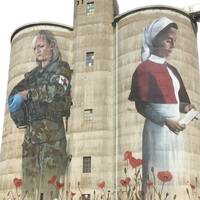 Jenny B
Jenny BThis transcription item is now locked to you for editing. To release the lock either Save your changes or Cancel.
This lock will be automatically released after 60 minutes of inactivity.